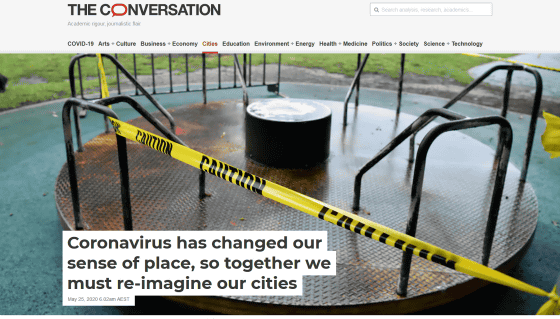It is pointed out that after the pandemic of the new coronavirus, 'the way the city should be' must be reconsidered

Following the pandemic of the new coronavirus infectious disease (COVID-19), each country has taken measures such as demanding that the people refrain from going out unnecessarily and implementing mandatory city blockades.
Coronavirus has changed our sense of place, so together we must re-imagine our cities
https://theconversation.com/coronavirus-has-changed-our-sense-of-place-so-together-we-must-re-imagine-our-cities-137789

A city is not just a space where buildings are lined up and infrastructure is maintained, but it consists of people who live in or come from other places, work, interact, and move. However, the pandemic of COVID-19 has restricted the movement of people and going out in each country, and people have disappeared from cities around the world.
So far, people have developed the feeling of being “connected to the city” by utilizing various functions of the city. But Matthews pointed out that the COVID-19 pandemic has fundamentally disrupted the connection between people and the city because it has changed the basics of urban life-sharing the same space as others-in the city.
“Many city residents are redefining their sense of place in response to the COVID-19 pandemic. After this pandemic, we cannot see our city as it once was.” Our perceptions and priorities could possibly change permanently, '' said Matthews, who reconsiders the city's vision after a pandemic, not only practically but philosophically. Insist that you need to.

The impact of pandemics on cities is so serious that they can be categorized as 'transforming stressors,' Matthews said. The stressors that bring about change are rare events, but once they occur, they have a great impact on various aspects such as economic activity, human health, and social order, and everyone must endure the confusion.
Transforming stressors keep track of system problems and weaknesses, and the impact can be catastrophic in cities where so many systems are integrated and complex. COVID-19 may also continue to exist as an ongoing risk in urban life, as it may not disappear entirely after the pandemic has somehow managed to converge.
`` When a transforming stressor hits a city, it poses an immediate threat to worries that were so far away. What once used to be credible and comfortable no longer exists, and Matthews said: Will change accordingly and reconsider our 'sense of place' over time. '

The COVID-19 pandemic shakes the norms that have been established so far, but such a special situation is also an opportunity for policymakers to deviate from the usual way and adopt a unique way. As a result of many people waiting at home in stoic and increasing the time to work from home, etc., people are re-evaluating the 'sense of place' again, and some people also want to say about the future of the city increasing.
Matthews pointed out that the government, who plans the restoration and reform of the city, can learn important lessons by actually having meetings with the residents of the city. Interactions via online tools allow governments to capture people's needs, and residents to redefine the sense of a pandemic and confused place.
New changes in the city include an increase in active transportation, for example walking and biking. While the use of public transportation has declined due to the COVID-19 pandemic, people are beginning to realize the enjoyment of walking and biking, and it is in the residents' interest to provide many green spaces and comfortable social infrastructure in urban areas. There is a possibility that it will become.
Pandemics are an opportunity for people to rethink the city, and if they can successfully capture the views of the residents, it can make a big difference to urban planning. “This is an emergency that requires unusual reactions. It's time for city planners and decision makers to plan“ with people ”rather than“ for people, ”” Matthews said. He said.

Related Posts:
in Note, Posted by log1h_ik







